Table of Contents
To many of us, peanut butter is one of the favourite foodstuffs found in the kitchen. It’s tasty, creamy, and versatile: as a part of breakfast or a delicious dessert, or to add flavour to meat. The great taste isn’t, however, all it has to offer. Peanut butter is a rich source of healthy fats as well as protein.
It is its nutritional qualities that make it a staple in the world of fitness. But have you ever wondered about its origins, how the wide variety of peanut butters differ from one another and how to pick the best one? We promise that by the time you finish reading this article, you’ll have the answers.
The history of peanut butter
The first historical evidence of peanut butter dates back to the age of ancient Incas and Aztecs. They would be the first peoples to process roasted peanuts into a paste, still significantly different from today’s butters. The invention of peanut butter as we know it now, however, associates with several names. It was first patented in 1884 by the Canadian chemist Marcellus Gilmore Edson, whose heated mill would grind roasted peanuts into a buttery substance.
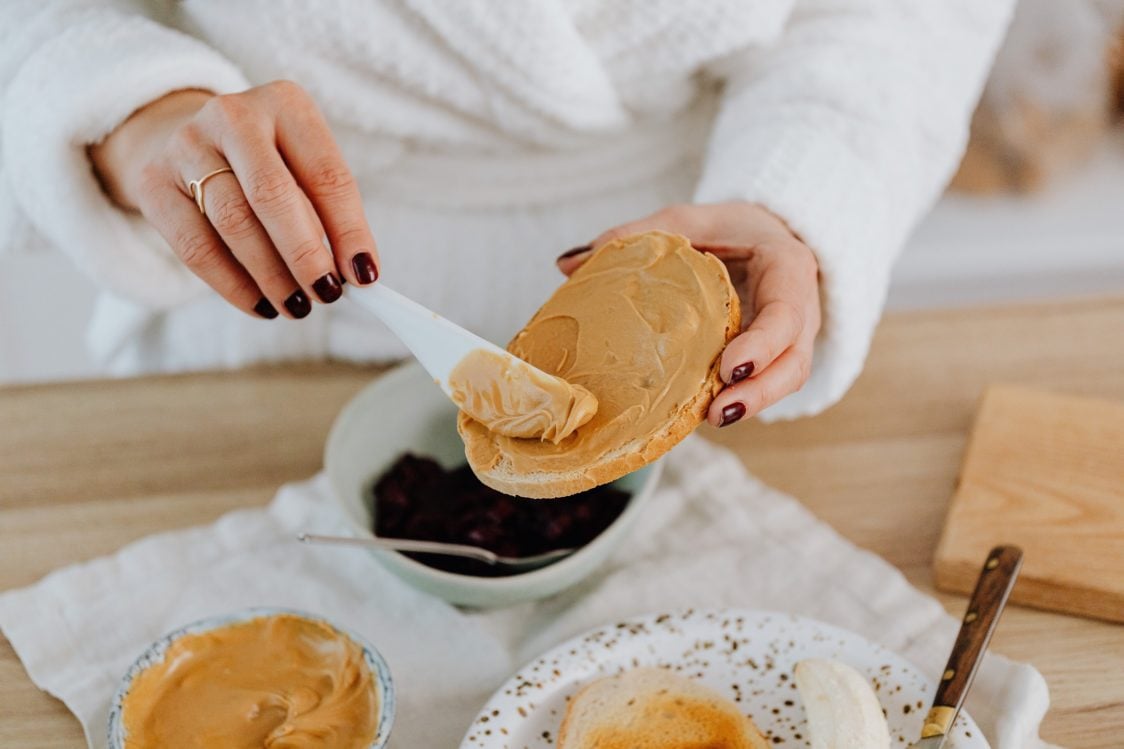
However, the peanut delicacy wouldn’t achieve any commercial success until later, when it passed through the hands of George A. Bayle, a businessman, whose profitable plan was born, according to several sources, after he had met John Harvey Kellog, the famed father of peanut butter.
Kellog patented his own recipe in 1895. As a doctor, he prescribed peanut butter to those of his patients, who couldn’t ingest solid food, firmly believing that proper nutrition is the key to their return to health. His version of peanut butter was, however, made of peanuts that were first boiled instead of roasted, as they normally are today. [1–3]
Peanut butter nutrition values
Peanut butter can easily be a part of a healthy and balanced diet. Not only is it helpful for gaining weight, it can also effectively make its way to a diet designed for weight loss, too! Its major advantage is the high content of protein, as well as of vitamins and minerals. It is, though, also very rich in calories, and has to be consumed in moderation. Even though its high content of fat might be in the category of what’s called the “good fats”, it is, nevertheless, still fat. [4]
The usual serving size of peanut butter is 2 table spoons (about 32g). This serving contains roughly the following amount of nutrients[5]:
Nutrition Facts | 100 g | 32 g |
|---|---|---|
| Calories | 596 kcal | 190,7 kcal |
| Total fat | 46 g | 15,7 g |
| Saturated fat | 6,8 g | 2,1 g |
| Total carbohydrates | 14 g | 4,4 g |
| Sugars | 6,6 g | 2,1 g |
| Dietary fibre | 9,1 g | 2,9 g |
| Protein | 27 g | 8,6 g |
| Salt | 0 g | 0 g |
Any typical peanut butter also boasts a decent amount of vitamins and minerals. Per 100g it usually contains: vitamin E (9 mg), vitamin B3 (13,4 mg), vitamin B6 (0,5 mg), magnesium (154 mg), phosphorus (358 mg), zinc (2,9 mg) and manganese 1,5 mg. [22]
When consuming a serving of typical size you should also keep in mind the amount of saturated fats. According to WHO, saturated fats should make only about 10% of your entire calorie intake.
These are mainly found in animal products, such as smoked meats, butters or other fatty milk products, although they can be also found in plant products such as coconut fat. WHO recommends consuming a maximum of 22 g a day. The American Heart Association, however, takes a much more strict stance, capping this number at 13 g.
It is important to mention though, that as it is the case with any food, we have to look at its contents as a whole. Just because a product contains saturated fats, it doesn’t necessarily mean it is bad for your health. In the case of peanut butter, the unhealthy fats represent only about 20% of the entire fat content, the rest of which is the healthy fats. A similar ratio is found in olive oil. Eating peanut butter isn’t therefore particularly worrisome when it comes to potential health risks. [4] [6] [13] [19]
You might be interested in these products:
High vs low quality peanut butter
When shopping for any foods, it is always important to look for high quality products. Peanut butter is not an exception. The golden rule of picking up truly healthy peanut butter is that it should contain as few ingredients as possible, which means the particular product went through the least amount of processing. The best quality peanut butter contains one and only ingredient – peanuts.
Peanut butters of lesser quality usually contain added sugar, salt, food preservatives or palm oil. This ultimately contributes to degradation of their nutritional properties and raises the amount of substances that are potentially risky for your health. [7]
General advantages of eating 100% peanut butter
Peanuts are associated with effects that can positively impact your health. Among the most well-known are:
1. Improves cardiovascular health
Heart disease is one of the leading death causes. Peanuts contain a lot of healthy nutrients such as magnesium, niacin, copper, or oleic acid. Several studies point towards peanuts, along with other nuts, having beneficial effects in terms of helping prevent cardiovascular diseases. [8–10]
This is something you should consider within the larger context of healthy lifestyle and eating habits, which is something you can read about here:
What Is a Healthy Diet and How to Learn to Eat Healthily?
2. Lowers your cholesterol
A study published in Journal of Food Science and Technology shows that peanuts can be a great source of resveratrol, phenolic acid, flavonoids and phytosterols. These bioactive substances, coupled with healthy fats, can impact your lipid profile beneficially. [11]
Together with eating healthily, these help you lower the presence of risk substances, such as saturated or trans unsaturated fatty acids. Add active lifestyle, and your lipid spectrum will shape up considerably, thus lowering your bad LDL cholesterol, balancing it out with the good, HDL cholesterol instead. [20]
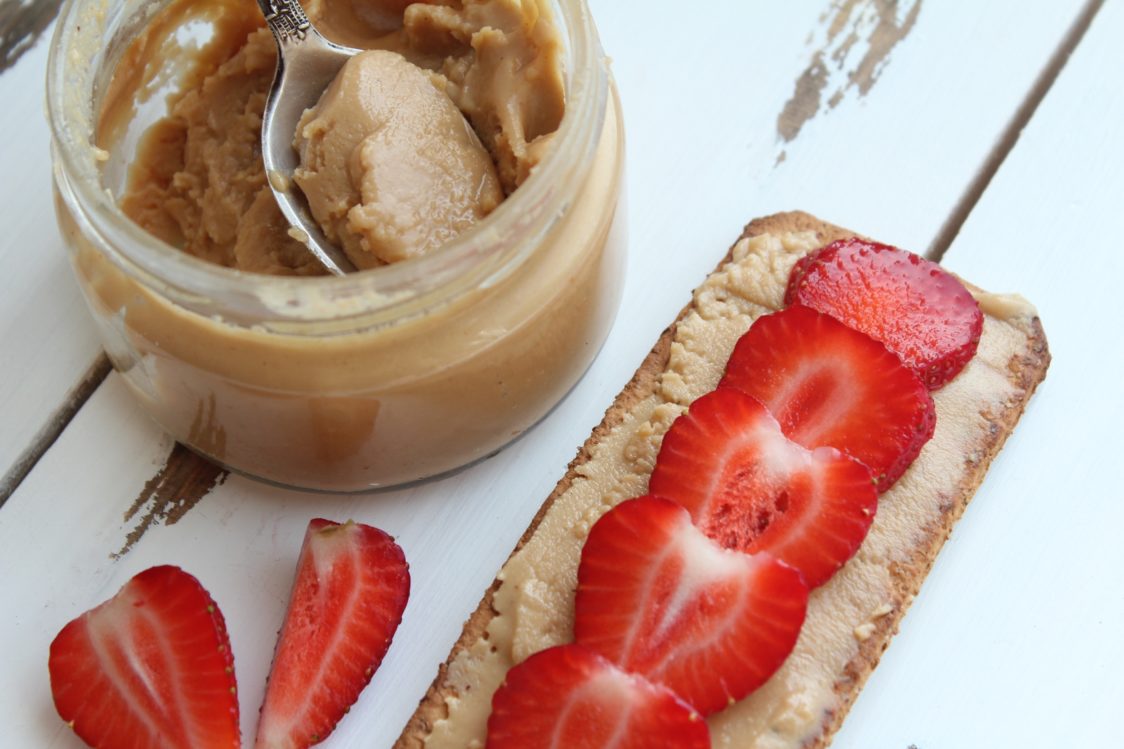
3. Can lower the risk of developing type 2 diabetes
Research shows that eating peanut butter can, as a part of healthy and balanced diet tailored to your individual needs, help reduce the risk of type 2 diabetes, thanks to the unsaturated fats which can improve your sensitivity to insulin. [12]
If you want to avoid raising your calorie intake, it is recommended to eat nuts regularly as a substitute to refined wheat products or processed red meat. [12]
If you want to learn more about other ways to improve your sensitivity to insulin, make sure to check out our article Insulin Sensitivity – How to Improve It and Avoid Insulin Resistance.
4. Rich in antioxidants
Raw peanuts contain antioxidants, which counteract harmful effects of free radicals. As you know, most peanut butters are made of roasted peanuts. Studies show that the process of roasting helps increase the contents of antioxidants in peanuts by 22%. Roasted peanuts can therefore contain an amount of antioxidants similar to that of strawberries or blackberries. [11] [14]
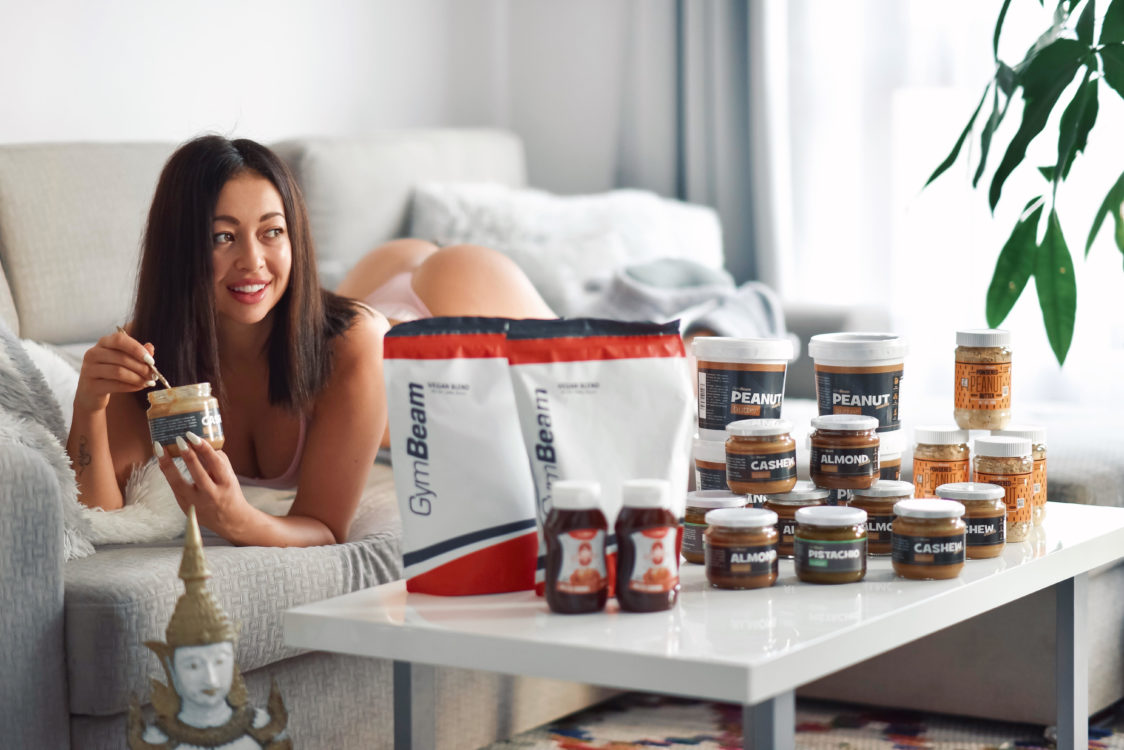
Peanut butter and working out
Peanut butter is not only beneficial to your overall health, but it also holds advantages specific to sports and exercise. Athletes all around the world rely on peanut butter to supply them with long lasting energy during their performance. [15]
Below we’ll discuss the advantages of eating peanut butter for those of you who actively work out or do sports.
1. Helps with weight reduction
Even though peanut butter contains a high amount of calories, it can be part of your diet. In fact, it has been shown that it can help with weight loss.
One of the studies published in 2018 sees a positive correlation between eating nuts and lowered weight gain in both children and adults. Within the span of 5 years, the study observed a diminished risk of overweight or obesity in those of its participants, who ate more nuts, including peanuts. [16]
Looking back at the nutritional facts of peanut butter, this might be due to its richness in fats, protein and dietary fiber, which help you feel satiated for a longer time. A study enlisting participants from among obese women showed, that the participants whose high-carb breakfasts were enriched with peanut butter reported less food cravings throughout their day. [21]
This effect can be achieved with a variety of nut butters. You can find our grand overview of nut butters in this article: Nut Butters, Their Differences, Nutritional Values, and Benefits.
2. Great source of nutrition after your workout
Experts agree that a post-workout snack in form of peanut butter provides a great source of healthy fats, protein and other nutrients that help with regeneration. The calories contained within will resupply your tired muscles and the wealth of micronutrients will help prevent malnutrition after hard work. The best post-workout strategy, however, remains with fast absorbing protein foods, which can be enriched with peanut butter. We’ll further discuss its other uses below.
Remember, it’s important to keep the high calorie content in mind. If you’ve decided to add peanut butter into your diet, make sure to adjust your servings to your weight goals, whether it is losing far or gaining muscle mass. [17]
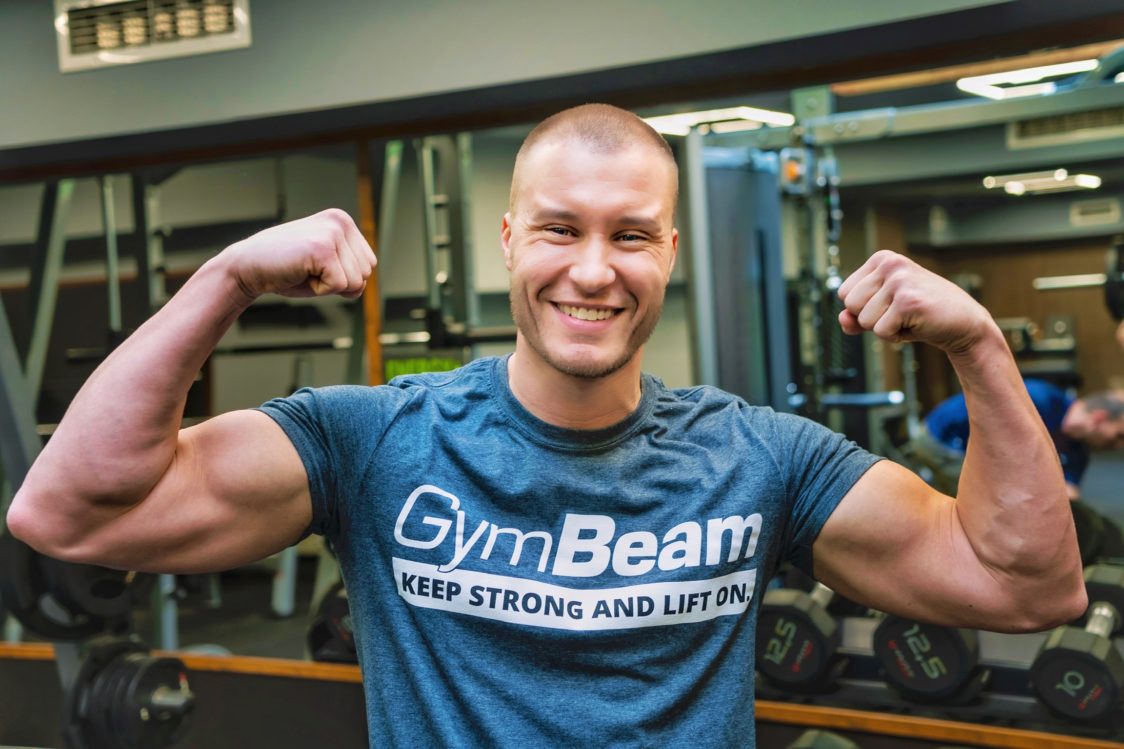
3. Good calories at a good price
If you count yourself among hungry, hard-working athletes, your caloric intake can climb up to over 3000 kcal a day. Peanut butters are among the cheapest athletic fuels that can be enjoyed any time of the day, which can help you increase your energy intake and help you gain weight in form of muscle mass, especially if you are one of the so-called “hardgainers”, whose body doesn’t develop muscle so easily. [18]
4. Rich in protein necessary for muscle building
Peanut butter is a go-to for many athletes looking to gain muscle mass. It is a high-quality source of energy and protein, both of which play a crucial role in building and maintaining of muscles. While peanut butter isn’t a primary source of protein out there, it certainly is one of the foods that can boost your protein intake on the side.
If you’re interested in learning more about muscle building, do not miss our article Protein – When and How Much to Eat for Maximum Results
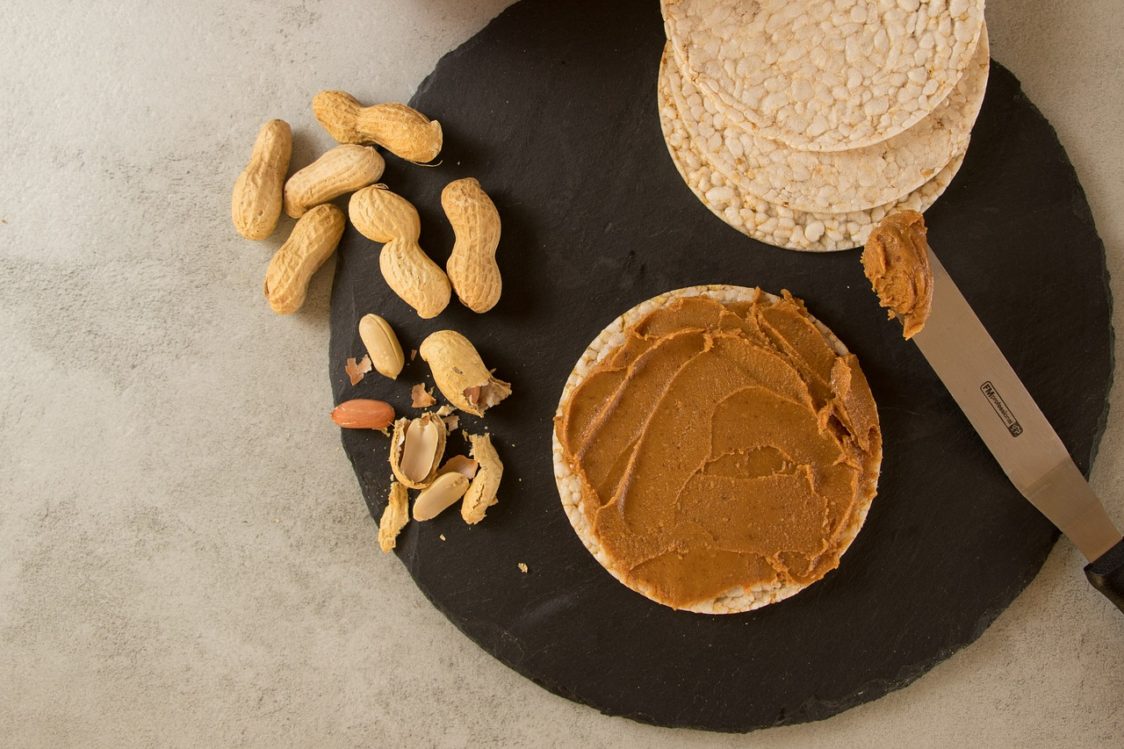
Tasty recipes using peanut butter
One of the great things about peanut butter is that it tastes amazing on its own. But it’s even better when you can work it into a delicious recipe. It’s stellar not only for baking pies, cookies or brownies, or as a key ingredient in smoothies and ice creams, but in a whole bunch other foods as well. Wherever you choose to use it, it will not only lend its delicious flavour, but also supply a solid dose of vitamins, minerals, healthy fats and other nutrients.
For an overview of the many different ways you can use peanut butter in your kitchen, check out 10 Amazing Recipes with Peanut Butter.
GymBeam recipes using peanut butter
If you’re looking for even more inspiration, here’s a bunch of other recipes using peanut butter that we’ve prepared for you:
- Fitness Recipe: Low-Carb Peanut Cookies
- Fitness Recipe: Chocolate Muffins Filled with Peanut Butter
- Fitness Recipe: Cottage Cheese-Based Bundt Cake with Peanut Butter and Cocoa
- Fitness Recipe: Healthy Pumpkin Pancakes with Peanut Butter and fruit
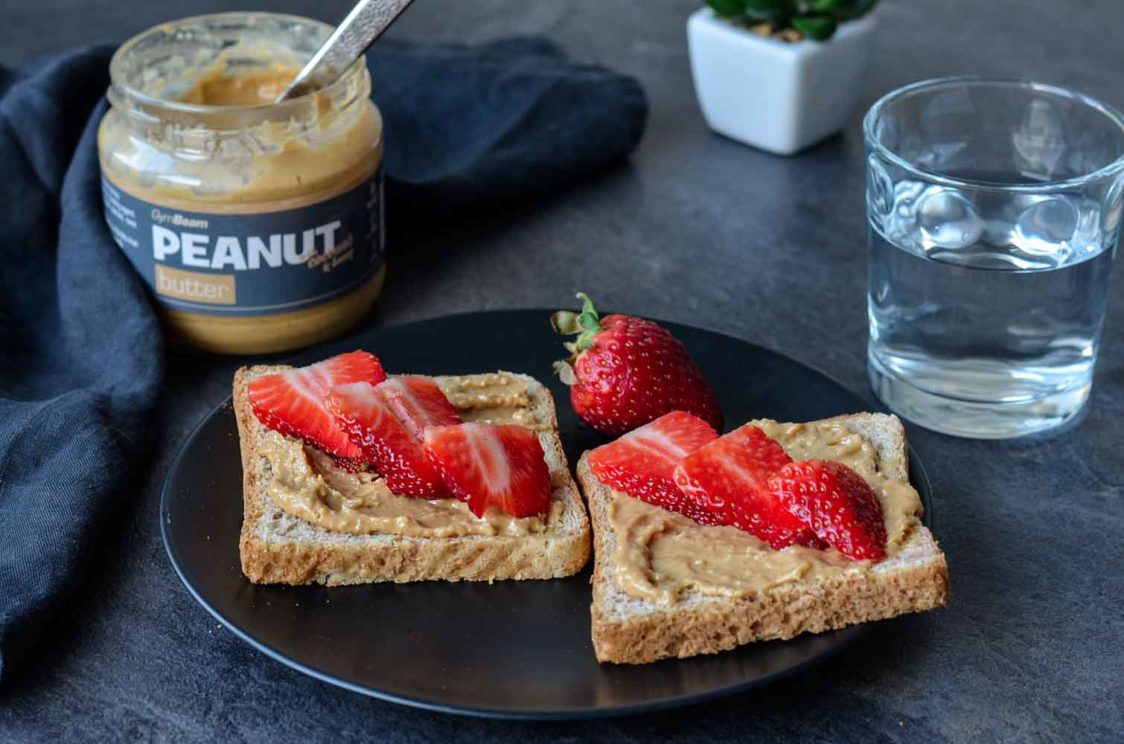
Summary
Peanut butter is an extraordinarily tasty, creamy foodstuff with a rich history, originally used for medicinal purposes, which has maintained its great popularity to this day. It boasts considerable levels of high quality nutrients, protein, healthy fats, as well as vitamins and minerals.
Thanks to that, it can be of great help in fulfilling your fitness goals. You should, however, always go for high quality, 100% pure peanut butters, the only ingredient of which is peanuts and nothing else. Any added substances, such as sugar, salt, or palm oil are in truth just undesirable stuffing, which only diminishes peanut butter’s otherwise great health benefits you can enjoy in a rich variety of foods both sweet and savory.
Love peanut butter? Do you enjoy it on its own or as a part of your favorite recipe? Make sure to share your experience with peanut butter in comments. If you liked this article, we’ll appreciate every reaction and share!
[1] Who Invented Peanut Butter? – https://www.nationalpeanutboard.org/peanut-info/who-invented-peanut-butter.htm
[2] Tuan C. Nguyen - The History of Invention of Peanut Butter – https://www.thoughtco.com/who-invented-peanut-butter-4082744
[3] Debra Kelly - The Untold Truth Of Peanut Butter – https://www.mashed.com/229504/the-untold-truth-of-peanut-butter/
[4] Jayne Leonard - Is peanut butter good for you? – https://www.medicalnewstoday.com/articles/323781#health-benefits
[5] Malia Frey - Peanut Butter Nutrition and Health Benefits – https://www.verywellfit.com/is-peanut-butter-good-for-you-3495231#citation-1
[6] Saturated Fat – https://www.heart.org/en/healthy-living/healthy-eating/eat-smart/fats/saturated-fats
[7] Lauren Panoff - 6 of the Healthiest Peanut Butters – https://www.healthline.com/nutrition/healthiest-peanut-butter#choosing-a-healthy-peanut-butter
[8] F B Hu, M J Stampfer - Nut consumption and risk of coronary heart disease: a review of epidemiologic evidence – https://pubmed.ncbi.nlm.nih.gov/11122711/
[9] F B Hu, M J Stampfer, J E Manson, E B Rimm, G A Colditz, B A Rosner, F E Speizer, C H Hennekens, W C Willett - Frequent nut consumption and risk of coronary heart disease in women: prospective cohort study – https://pubmed.ncbi.nlm.nih.gov/9812929/
[10] Tricia Y Li, Aoife M Brennan, Nicole M Wedick, Christos Mantzoros, Nader Rifai, Frank B Hu - Regular consumption of nuts is associated with a lower risk of cardiovascular disease in women with type 2 diabetes – https://pubmed.ncbi.nlm.nih.gov/19420347/
[11] Shalini S. Arya,Akshata R. Salve, S. Chauhan - Peanuts as functional food: a review – https://www.ncbi.nlm.nih.gov/pmc/articles/PMC4711439/
[12] Rui Jiang, JoAnn E. Manson, Meir J. Stampfer - Nut and Peanut Butter Consumption and Risk of Type 2 Diabetes in Women – https://jamanetwork.com/journals/jama/article-abstract/195554
[13] Walter C. Willett M.D. - Ask the doctor: Why is peanut butter "healthy" if it has saturated fat? – https://www.health.harvard.edu/healthy-eating/ask-the-doctor-why-is-peanut-butter-healthy-if-it-has-saturated-fat
[14] Peanuts Rival Fruit As Source Of Health-Promoting Antioxidants, UF Researchers Say – https://news.ufl.edu/archive/2004/12/peanuts-rival-fruit-as-source-of-health-promoting-antioxidants-uf-researchers-say.html
[15] Why World-Class Athletes Rely on Peanut Butter – https://www.nationalpeanutboard.org/news/fueling-athlete.htm
[16] Heinz Freisling, Hwayoung Noh, Nadia Slimani, Véronique Chajès, Anne M May a kol. - Nut intake and 5-year changes in body weight and obesity risk in adults: results from the EPIC-PANACEA study – https://pubmed.ncbi.nlm.nih.gov/28733927/
[17] Brian Willett - Eating Almonds After a Workout – https://www.livestrong.com/article/495105-eating-almonds-after-a-workot/
[18] Peanut Butter: A Super Sports Food – https://www.bodybuilding.com/content/peanut-butter-a-super-sports-food.html
[19] Healthy Diet – https://www.who.int/en/news-room/fact-sheets/detail/healthy-diet
[20] Steven Mann, Christopher Beedie, Alfonso Jimenez - Differential Effects of Aerobic Exercise, Resistance Training and Combined Exercise Modalities on Cholesterol and the Lipid Profile: Review, Synthesis and Recommendations – https://www.ncbi.nlm.nih.gov/pmc/articles/PMC3906547/
[21] Caio E G Reis, Daniela N Ribeiro, Neuza M B Costa, Josefina Bressan, Rita C G Alfenas, Richard D Mattes - Acute and second-meal effects of peanuts on glycaemic response and appetite in obese women with high type 2 diabetes risk: a randomised cross-over clinical trial – https://pubmed.ncbi.nlm.nih.gov/23122211/
[22] Peanut butter, smooth style, without salt Nutrition Facts & Calories – https://nutritiondata.self.com/facts/legumes-and-legume-products/4453/2

